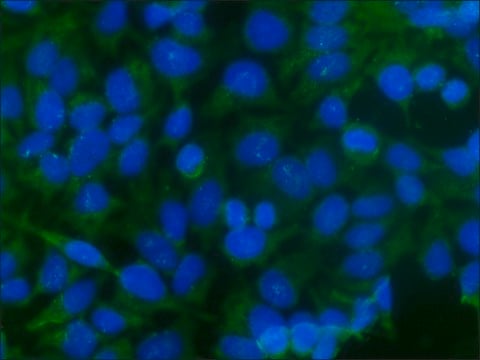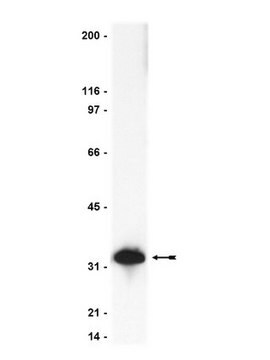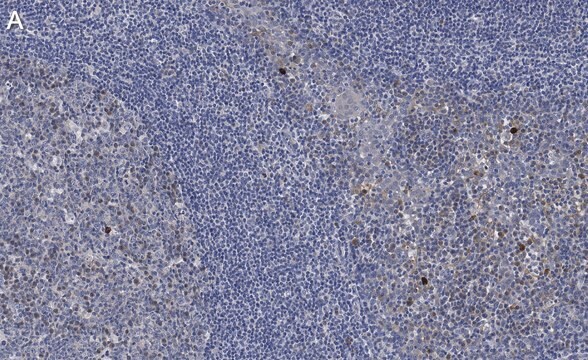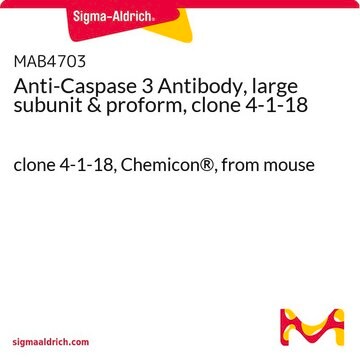추천 제품
생물학적 소스
mouse
Quality Level
결합
unconjugated
항체 형태
purified immunoglobulin
항체 생산 유형
primary antibodies
클론
84803.111, monoclonal
형태
lyophilized powder
종 반응성
human
기술
western blot: 1.0 μg/mL using human Jurkat cells
동형
IgG2b
UniProt 수납 번호
저장 온도
−20°C
타겟 번역 후 변형
unmodified
유전자 정보
human ... CASP3(836)
일반 설명
CASP3 (caspase 3) is a cysteine protease belonging to the caspase protein family, and is related to interleukin-1β-converting enzyme (ICE). It is the human homologue of Caenorhabditis elegans Ced-3 protein. This protein forms a key element of apoptosis.
특이성
Detects recombinant human precursor caspase 3 and the 18 kDa form produced during apoptosis.
면역원
recombinant 18 kDa subunit, amino acids 29-175, of human caspase 3.
생화학적/생리학적 작용
CASP3 (caspase 3) is an essential protein of apoptosis, which includes multiple death-inducing signals, and caspase 3 functions at the last steps of programmed cell death. This protein is shown to be expressed in esophageal squamous cell carcinoma (ESCC), and its down-regulation is related to increased malignancy and reduced overall survival. Its expression in metastatic lymph nodes (LN) might serve as a marker for poor survival prognosis in patients with resected ESCC and metastasis to LN. Studies in multiple cancers such as, gastric, colorectal, ovarian and cervical cancers show that aberrant expression of this gene is linked with cancer progression and aggressive behavior. It might have potential as a marker to determine the prognosis of the above cancers.
물리적 형태
Lyophilized from a 0.2 μm filtered solution in 0.01 M phosphate buffered saline with 5% trehalose.
면책조항
Unless otherwise stated in our catalog or other company documentation accompanying the product(s), our products are intended for research use only and are not to be used for any other purpose, which includes but is not limited to, unauthorized commercial uses, in vitro diagnostic uses, ex vivo or in vivo therapeutic uses or any type of consumption or application to humans or animals.
적합한 제품을 찾을 수 없으신가요?
당사의 제품 선택기 도구.을(를) 시도해 보세요.
Storage Class Code
11 - Combustible Solids
WGK
WGK 1
Flash Point (°F)
Not applicable
Flash Point (°C)
Not applicable
시험 성적서(COA)
제품의 로트/배치 번호를 입력하여 시험 성적서(COA)을 검색하십시오. 로트 및 배치 번호는 제품 라벨에 있는 ‘로트’ 또는 ‘배치’라는 용어 뒤에서 찾을 수 있습니다.
이미 열람한 고객
Sonia Sebastian et al.
Antioxidants (Basel, Switzerland), 12(8) (2023-08-26)
Nanoparticle-based therapeutics are being clinically translated for treating cancer. Even when thought to be biocompatible, nanoparticles are being increasingly identified as altering cell regulation and homeostasis. Antioxidant pathways are important for maintaining cell redox homeostasis and play important roles by
Qian Hu et al.
International journal of clinical and experimental pathology, 7(8), 5057-5070 (2014-09-10)
Emerging evidence has indicated that apoptotic cells have a compensatory effect on the proliferation of neighboring cells. Recent studies have shown that apoptotic tumor cells stimulate the repopulation of tumors from a small number of surviving cells by cleaved caspase-3
Xiu-Shen Wang et al.
World journal of gastroenterology, 20(15), 4414-4420 (2014-04-26)
To assess whether differential expression of caspase-3 in paired metastatic lymph nodes (LNs) is prognostic of survival in patients with resectable esophageal squamous cell carcinoma (ESCC). Capases-3 expression was evaluated immunohistochemically in 122 pairs of primary ESCCs and regional metastatic
Tingting Gu et al.
Oncology letters, 14(6), 6815-6822 (2018-02-10)
The present study explored the expression of tetraspanin 1 (TSPAN1) in esophageal carcinoma (EC) and its association with clinicopathological factors. TSPAN1 small interfering RNA (siRNA) was designed to target the TSPAN1 gene in Eca-109 cells in order to explore the
Elisa B Moutin et al.
Cellular and molecular gastroenterology and hepatology, 17(4), 639-656 (2024-01-11)
Chronic inflammatory illnesses are debilitating and recurrent conditions associated with significant comorbidities, including an increased risk of developing cancer. Extensive tissue remodeling is a hallmark of such illnesses, and is both a consequence and a mediator of disease progression. Despite
자사의 과학자팀은 생명 과학, 재료 과학, 화학 합성, 크로마토그래피, 분석 및 기타 많은 영역을 포함한 모든 과학 분야에 경험이 있습니다..
고객지원팀으로 연락바랍니다.









